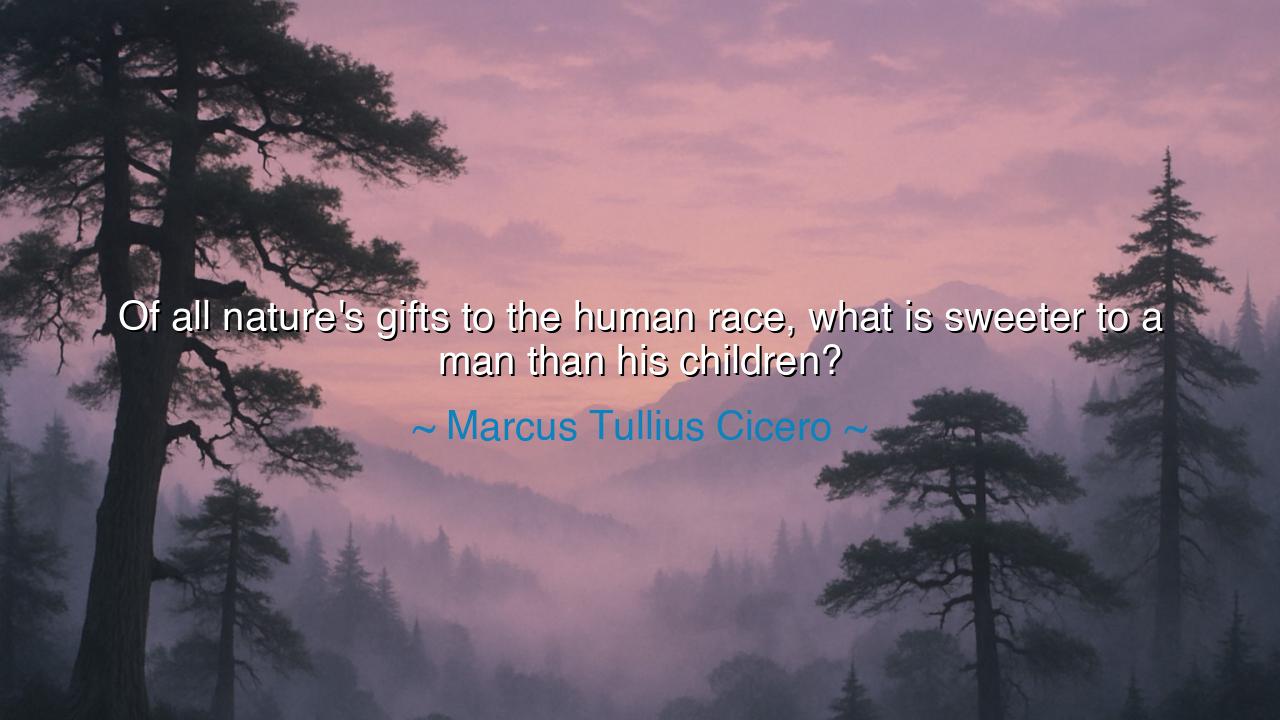
Of all nature's gifts to the human race, what is sweeter to a






Marcus Tullius Cicero, the Roman orator and philosopher, once declared with tender strength: “Of all nature’s gifts to the human race, what is sweeter to a man than his children?” In these words he unites the grandeur of Roman eloquence with the universal heartbeat of humanity. For Cicero, who spoke often of law, duty, and the republic, here turns to something far older than politics, far more enduring than empires—the bond between parent and child, the greatest of nature’s gifts.
The origin of this thought arises from Cicero’s meditations on family, virtue, and the natural order. The Romans believed that the household—familia—was the foundation of society, more sacred even than the state. To them, children were not only heirs, but living symbols of continuity, carriers of the father’s name and the mother’s love into the unknown future. Cicero himself, though beset by political turmoil and personal grief, cherished his beloved daughter Tullia, and it was her death that cast him into one of the deepest sorrows of his life. His words reflect both the joy of fatherhood and the aching recognition that children are the sweetest, yet most fragile, gift.
History abounds with echoes of this truth. Consider King Priam of Troy, who, though ruler of a mighty city, wept bitterly at the loss of his son Hector. All his riches, all his power, could not weigh more than the life of his child. Or think of Abraham Lincoln, who, amid the storms of civil war, grieved as deeply for the death of his young son Willie as for the countless soldiers who fell in battle. Both examples remind us that even kings and presidents, warriors and philosophers, bend under the same truth Cicero voiced: that the love of children surpasses all other treasures.
The meaning of Cicero’s words is emotional, evocative, and heroic. He proclaims that of all the riches offered by nature—the harvest of fields, the beauty of the earth, the strength of the body—none compares to the sweetness of children. For they are not possessions, but reflections of ourselves, bound not by ownership but by love. They are the hope that outlives us, the melody that continues when our voice falls silent. To hold a child is to glimpse eternity, to feel in one fragile life the full measure of joy and meaning.
And yet, Cicero’s words also carry a lesson of responsibility. If children are the sweetest of nature’s gifts, then they are also the most sacred of trusts. To mistreat, neglect, or ignore them is to dishonor both nature and the divine. The gift must be cherished, nurtured, and guided, for the sweetness is not in their mere existence, but in the bond of love, the shaping of virtue, the patient labor of parenthood. Thus, the quote is not only a celebration, but a call to duty.
The lesson for us is clear: honor your children above all other gifts. Pour into them the best of yourself—your time, your love, your wisdom. For wealth may vanish, glory may fade, and nations may crumble, but the love of children, and the legacy they carry forward, endures. Even if you have no children of your own, remember that every young life you touch—through teaching, mentoring, or simple kindness—partakes of this same sweetness, this same gift.
Practically, this means making space in life for what truly matters. Do not let ambition consume the time meant for love. Do not let distractions steal the hours meant for listening. Celebrate the laughter of children as greater than applause, their questions as greater than titles, their trust as greater than gold. For in their eyes shines the reflection of the eternal gift that Cicero praised: the sweetest blessing that nature bestows upon mankind.
Thus Cicero’s words endure, not as mere sentiment, but as timeless truth: children are the crown of nature’s gifts, the sweetest joy of man, the tender bridge between the mortal and the eternal. To cherish them is to live wisely; to neglect them is to forget what is most precious. Let this truth be carried forward, like a flame passed through generations, until the end of time.






AAdministratorAdministrator
Welcome, honored guests. Please leave a comment, we will respond soon